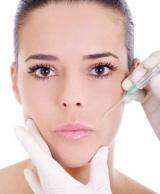May 1, 2012 report
Two studies find Botox injections help reduce nighttime teeth grinding

(Medical Xpress) -- Two groups working independently have found that patients who suffer from nighttime teeth grinding, a condition known as nocturnal bruxism, found relief after being injected in their temple and jaw muscles with Botox. Both groups reported on their findings at this year’s American Academy of Neurology meeting.
Many people grind their teeth at night when they are asleep, though some may be unaware of doing so. It’s the degree that matters. Some grind slightly and experience no negative consequences other than annoying their sleeping partner. Other’s however experience much more serious consequences such as teeth problems, jaw and facial pain and headaches. There is currently no known cure for the condition and treatment usually consists of issuing patients mouth guards which do protect the teeth, but don’t alleviate pain or headaches. Patients with severe symptoms clearly need something better and that is why researchers have started looking into the therapeutic possibilities of botulinum toxin, more commonly known as Botox; the very same material used for cosmetic purposes.
In the first study, a team from the University of Texas Health Science Center in Houston, injected 23 people who suffered from severe bruxism. Thirteen got Botox while ten received a placebo. Four weeks later all of participants were tested to see what impact, if any, the injections had had on their teeth grinding and quality of sleep.
Testing results were measured in two ways, via polysomnography and by reports from the patients themselves which also included comments by sleep partners.
Polysomnography is a rigorous set of tests that have been developed for sleep studies with many parameters involved to determine the quality of sleep people experience and also to account for such problems as headaches, pain, or other situations that arise due to sleep issues. In the Houston study, the results of the Polysomnography, called a polysomnogram, were averaged together with numbers given by patients to self-assess their quality of sleep. Taken together the team found the average numbers jumping from 47.3 for bruxism patients to 64.5 after receiving Botox injections. The numbers for the placebo patients didn’t change. In addition, the team found that numbers for pain experienced increased as well, from 44.2 to 65.0 (higher means less pain). Overall, the team says, the results indicated that injecting Botox provided significant relief for all of the patients who received it, while the only side effects were slight changes in appearance for some when smiling.
In the second study, doctors at the Henry Ford Medical Center in Detroit, injected four patients who were experiencing severe bruxism following head injuries, with Botox and reported at the conference that all four showed relief from the condition without any noticeable adverse side effects.
Both groups are careful to point out that much more robust studies will need to be undertaken with the results published in a medical journal before Botox can be claimed to be a true therapy for bruxism. On the other hand, since Botox can already be administered for other reasons, there is nothing stopping doctors from giving patients suffering from bruxism injections right away to try to help them.
© 2012 Phys.Org















